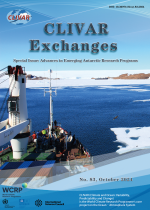Third Workshop on the Evalution of ENSO Processes in Climate Models
Hobart, Australia
Monday, 21 January, 2013 - Wednesday, 23 January, 2013
Since the establishment of the basic physical mechanisms 30 years ago, major progress in ENSO research has been made. New theoretical insights, together with longer and more comprehensive observations, increased computer power, and improved physical parameterizations of subgrid-scale processes, have resulted in better understanding of ENSO dynamics and much improved simulations of ENSO in CGCMs. If the basic properties of ENSO are now well understood and simulated, the community is nevertheless now faced with the much harder problem of addressing its detailed properties (e.g. skewness, diversity of events, physical feedbacks, asymmetries between El Niño and La Niña, etc.) and how these evolve in a slowly (decadal to centennial) varying background. Further progress requires interaction of diverse research communities, a process recently undertaken through Intercomparison of state-of-the-art CGCMs (CMIP3 and CMIP5).
Over the past few years, new promising methods have emerged, which can improve ENSO simulations, for example by bridging ENSO theoretical frameworks and CGCM modeling. Examples include the development of indices that can be used to assess the stability of ENSO in CGCMs and intermediate models that can be used to predict ENSO characteristics from aspects of the mean state. By focusing on the key processes affecting ENSO dynamics (e.g., the thermocline feedbacks or the wind stress response to SST anomalies), these new approaches have strong potential to accelerate progress and improve representation of ENSO in complex climate models. The relative role of the ocean and the atmosphere in shaping ENSO is being significantly revisited and a number of studies suggest that regions outside the tropical Pacific have a role in the advent of ENSO. Not only can these new methods and research areas help address the question of whether the characteristics of ENSO are changing in a changing climate, but potentially they can also improve reliability of centennial-scale climate projections and predictions on seasonal time scales.
The workshop aims at making progress on this issues, building on the two previous workshops held in Paris in 2006 and 2010. Specific goals will include reviewing the existing approaches to evaluate ENSO processes in GCMs, further exploring the potential of methods bridging ENSO theoretical frameworks and GCM modelling. A specific outcome will be to propose a standard ENSO evaluation protocol for CGCMs.
The workshop will be limited to 50 persons.
Please register your interest in participating, including the potential topic, with Wenju.Cai@csiro.au andEric.Guilyardi@locean-ipsl.upmc.fr.
Organising committee:
Wenju Cai (CSIRO, Australia)
Eric Guilyardi (LOCEAN/IPSL, France and NCAS-Climate, UK)
Mike McPhaden (PMEL, USA)
Andrew Wittenberg (GFDL, USA)
Mat Collins (Univ. Exeter, UK)
Andrew Wittenberg (GFDL, USA)
And others ….













